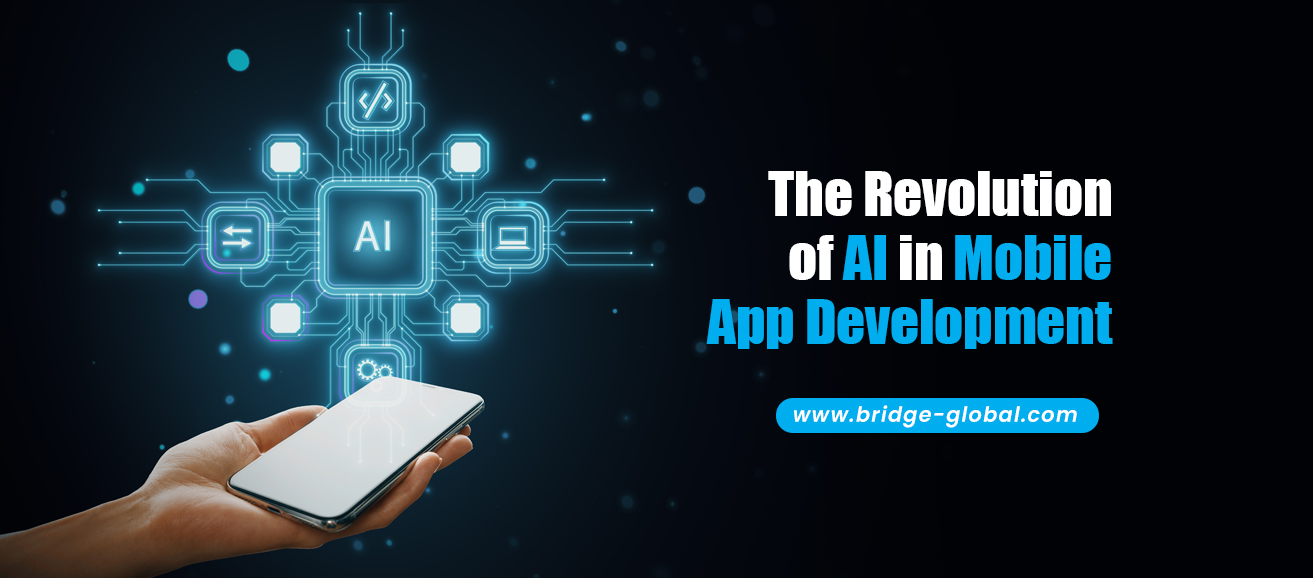Revolutionizing Mobile Apps: The Impact of AI in Mobile App Development
The world of mobile applications is experiencing a significant transformation. Artificial intelligence in mobile apps is not just a thing of the future anymore; it is quickly becoming a vital component for companies aiming to develop captivating and smart user experiences.
With features like smart chatbots, tailored suggestions, instant image recognition, and voice-activated assistants, AI is revolutionizing our interactions with mobile technology. These innovations are not just enhancing functionality; they are reshaping how we connect with technology on a personal level.
Understanding the Role of AI in Mobile Apps
Artificial Intelligence, often abbreviated as AI, is fundamentally a segment of computer science dedicated to developing smart systems that replicate human thinking processes. When we talk about mobile applications, AI plays a crucial role by incorporating diverse technologies that allow these apps to learn from user interactions, adjust to different situations, and execute tasks in a way that simulates human intelligence.
Here are some of the key AI technologies that are changing the game for mobile app development:
Machine Learning: This innovative approach enables applications to enhance their functionality over time without the need for direct programming. By utilizing machine learning algorithms, these apps can sift through data to uncover trends and make informed predictions. This capability leads to features such as tailored recommendations and effective spam filtering, significantly improving user experience.
Natural Language Processing (NLP): NLP equips applications with the ability to understand and interact with human language. This cutting-edge technology is integral to functionalities like chatbots, voice-activated assistants, and sentiment analysis, fostering more seamless and intuitive communication between users and apps. As a result, users can engage with technology more naturally.
Computer Vision: Through computer vision algorithms, applications can derive valuable insights from images and videos. This technology powers features such as facial recognition, object detection, and augmented reality, enhancing the level of engagement within mobile applications.
By incorporating these advanced AI technologies, developers can craft smart and user-friendly applications that meet the dynamic demands and preferences of their audience.
Latest AI Trends in Mobile App Development

Evolution of Chatbots and Virtual Assistants
AI-driven chatbots are advancing rapidly, providing immediate customer support, tackling intricate inquiries, and even handling transactions. Virtual assistants such as Siri and Google Assistant are also progressing, seamlessly integrating with mobile applications to manage tasks like setting up appointments or organizing travel plans.
The Era of Hyper-Personalization
AI is transforming mobile applications by offering an unparalleled degree of personalization. By examining user behavior, preferences, and previous interactions, AI can tailor everything from content suggestions to product recommendations, significantly boosting user engagement and satisfaction. For example, an AI-enhanced music streaming service can create customized playlists that reflect a user’s listening patterns.
The Rise of Voice Search and Commerce
The popularity of voice assistants has sparked a rise in voice search and commerce. Mobile applications powered by AI are now integrating voice search capabilities, enabling users to find information, make purchases, and manage features through natural language voice commands.
AI Enhancing Augmented Reality (AR) and Virtual Reality (VR)
AI is significantly contributing to the evolution of AR and VR experiences in mobile applications. By facilitating real-time object detection and an understanding of surroundings, AI enables the creation of engaging and interactive AR/VR experiences across a range of uses, including gaming, education, product visualization, and even arranging furniture in your home.
Enhanced Security and Fraud Prevention
AI is also being utilized to strengthen security measures in mobile applications. Through the use of machine learning algorithms, user behavior can be analyzed to spot any unusual activities, which aids in fraud prevention and ensures the safety of user information.
Integration of AI in Mobile Apps: Best Practices
Incorporating AI into mobile applications necessitates thoughtful planning, strategic execution, and a focus on the user experience. Here are some essential best practices to keep in mind:
1. Define Purpose and Value Proposition
First and foremost, it’s crucial to establish a clear purpose and value proposition for your AI features. Before you start the development process, take the time to identify the specific problem your AI aims to address or the value it will bring to users. Avoid adding AI just for the sake of it; make sure it has a defined role that enhances the overall functionality of your app.
2. Prioritize User Experience (UX) Design
The AI features should blend seamlessly with the app’s overall design. Ensure that the user interfaces are intuitive and easy to navigate, and provide users with clear instructions or explanations regarding how to use the AI functionalities effectively.
3. Focus on Privacy and Security
User trust and transparency are essential in today's digital landscape. It's important to be clear about how data is collected, ensure strong security protocols are in place, and comply with privacy laws. Additionally, giving users the ability to manage their data and its usage can enhance their confidence in your platform.
4. Start Small and Iterate
Avoid overwhelming your users with a plethora of complex AI features right away. Instead, focus on integrating a few key functionalities initially and actively seek user feedback. By continuously refining your AI models based on user interactions and real-world applications, you can create a more effective and user-friendly experience.
5. Emphasis on Transparency
Aim for AI that is easy to understand whenever possible. Educate users on how AI features arrive at their decisions or suggestions within the application. This approach fosters trust and encourages users to engage more freely with the AI capabilities offered.
6. Recognize and Address Biases
It's important to be aware of any biases that may be present in the training data for your AI models. By taking proactive steps to reduce these biases, you can help ensure that your AI functionalities are equitable and accessible to everyone.
7. Choose the Right Tools and Platforms
There are numerous tools and platforms available that can facilitate the development and integration of AI capabilities in mobile applications. Options such as cloud-based AI services, mobile-optimized AI frameworks, and customizable pre-trained AI models can significantly enhance your project.
Evolution of AI in Mobile Apps

The potential for AI in mobile applications is filled with exciting opportunities. Let’s take a look at what the future may hold:
Advancing AI Technologies: Innovations in fields such as natural language processing and computer vision are set to enhance the sophistication and intuitiveness of AI features in mobile applications.
The Emergence of Edge Computing: With edge computing, mobile devices will be able to handle more sophisticated AI tasks right on the device itself. This advancement will lead to lower latency and a significantly enhanced user experience.
Integration with the Internet of Things (IoT): AI-driven mobile applications will effortlessly connect with IoT devices, fostering a more cohesive and intelligent ecosystem for users.
Enhanced Personalization through Context Awareness: AI will evolve to become increasingly aware of the context in which it operates, tailoring the mobile app experience to individual users. Factors such as location, time of day, and even the user's emotional state will influence how apps respond and interact.
The Wrap
The realm of mobile applications is about to undergo a groundbreaking change driven by artificial intelligence. For companies, integrating AI into mobile app development is no longer merely a choice; it has become a crucial strategy to stay competitive and pertinent in today's rapidly evolving digital landscape. You can leverage the potential of AI in mobile apps by partnering with an experienced and reliable AI development company that offers top-notch artificial intelligence development, generative AI development, AI integration services, and much more!



